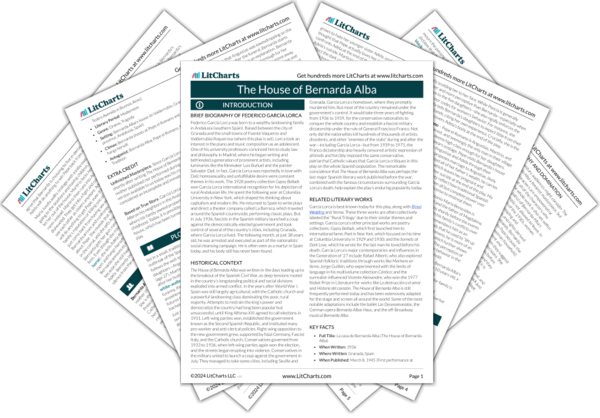Horses represent traditional masculinity, male sexuality, and men’s power over women in Bernarda’s village. While the association between men and horses stems from the Spanish nobleman’s traditional occupation, overseeing his fields on horseback, it also gives them a mobility and authority that women lack. For instance, while Bernarda and her daughters could scarcely venture far from their home even if they wanted to, Pepe el Romano rides far on his horse to visit Angustias and Adela nightly. He even survives Bernarda’s shooting by riding away into the night.
Bernarda also keeps a corral with horses and mules behind her house. Her neighbor Prudencia’s highest praise for Bernarda is that her herd is well-bred, and Bernarda describes a stallion in the corral that cannot wait to mate—which is a clear metaphor for Pepe’s virility and foreshadows his tryst with Adela. In fact, Martirio and Amelia comment that they hear sounds coming from the corral at night—this is clearly Pepe and Adela, but Amelia chalks it up to an unruly mule. This association between mating animals, human sexuality, and the creation of a pure bloodline exposes the sense in which the traditional honor code in Bernarda’s village is really an elaborate scheme to protect men’s sexual access to women.
Horses Quotes in The House of Bernarda Alba
MAGDALENA: Neither mine nor yours. I know I’m not going to get married. I'd rather carry sacks to the mill. Anything but sit in this dark room, day after day!
BERNARDA: That’s what it means to be a woman.
MAGDALENA: To hell with being a woman!
BERNARDA: Here you do what I tell you to do! You can't run to your father with your stories anymore. A needle and thread for females; a mule and a whip for males. That’s how it is for people born with means.










